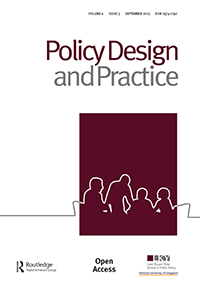区块链作为公共部门转型的驱动力
IF 2.6
Q1 PUBLIC ADMINISTRATION
引用次数: 1
摘要
最初为比特币设计的区块链架构,通过分散的交易和安全的数据管理,彻底改变了金融。它已被用于维护私人公民记录,允许数据所有者通过区块链授予直接通信的访问权限。尽管潜力巨大,但公民和公共部门对这项技术的探索相对较少。本文通过全面的文献综述,旨在阐明这一领域。研究重点包括两个关键要素:(1)分析区块链维度;(2)探索其对公共部门的变革性影响。该方法涉及对区块链分析方面的现有研究及其在重塑公共行政方面的作用进行广泛的元分析。此外,对公共服务领域的信息技术(IT)专家进行了问卷调查,将他们的看法与既定的科学研究进行比较。该研究的核心发现涉及多个分析维度,包括监管风险、数据管理挑战、隐私问题和技术限制。在转型方面,采用区块链技术的组织期望增强网络服务,加强数据安全性,运营效率,知情决策和新型公共服务。区块链在推动创新服务和保护数据方面的潜力得到了广泛认可,但与没有区块链的组织相比,拥有区块链的组织对其实际影响持谨慎乐观态度。本文章由计算机程序翻译,如有差异,请以英文原文为准。
Blockchain as a driver for transformations in the public sector
Blockchain architecture, originally designed for Bitcoin, has revolutionized finance through decentralized transactions and secured data management. It has been utilized to maintain private citizen records, allowing data owners to grant access via the blockchain for direct communication. Despite its potential, this technology remains relatively unexplored by both citizens and the public sector. By carrying out a thorough literature review, this article aims to shed light on this field. The research focus encompasses two key elements: (1) analyzing blockchain dimensions and (2) exploring its transformative impact on the public sector. The methodology involves an extensive meta-analysis of existing research on blockchain’s analytical aspects and its role in reshaping public administration. Additionally, a questionnaire is administered to Information Technologies (IT) experts in public services, comparing their perceptions with established scientific studies. The research’s core findings address various analysis dimensions, including regulatory risks, data management challenges, privacy concerns, and technological limitations. On the transformation front, organizations adopting blockchain technology anticipate enhanced networked services, fortified data security, operational efficiency, informed decision-making, and novel public services. The potential of blockchain to drive innovative services and safeguard data is widely acknowledged, yet organizations with blockchain are cautiously optimistic about its practical implications compared to those without.
求助全文
通过发布文献求助,成功后即可免费获取论文全文。
去求助
来源期刊

Policy Design and Practice
PUBLIC ADMINISTRATION-
CiteScore
10.30
自引率
4.30%
发文量
19
审稿时长
13 weeks
期刊介绍:
 求助内容:
求助内容: 应助结果提醒方式:
应助结果提醒方式:


